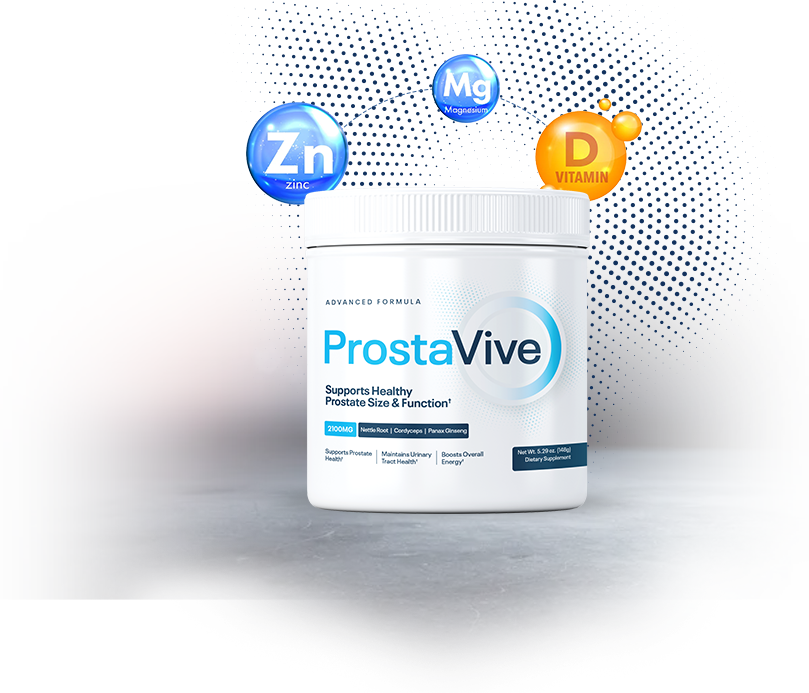An enlarged prostate, also known as benign prostatic hyperplasia (BPH), is a common condition that affects many men as they age. It can lead to uncomfortable symptoms such as frequent urination, a weak urine stream, and the inability to fully empty the bladder. While medical treatments are available, many men seek home remedies to help manage their symptoms and improve their quality of life.
In this article, we’ll explore some of the most effective home remedies for managing enlarged prostate symptoms and provide natural alternatives that can complement medical treatment.

ProstaVive is a dietary supplement made to help with prostate health, a key part of men’s health. It’s important to know how ProstaVive works and its main features. This info helps people make smart choices about their health.
ProstaVive uses natural ingredients, making it a favorite among those who care about their health. It aims to boost prostate health, which is crucial for men’s health and happiness. Taking ProstaVive might help lower the risk of prostate problems and keep life quality high.
Understanding Enlarged Prostate (BPH)
BPH is a non-cancerous enlargement of the prostate gland, which can cause urinary symptoms by pressing against the urethra and bladder. Though BPH is common in older men, not all men experience symptoms, and the severity can vary greatly from person to person. Managing BPH often requires a combination of lifestyle changes, medications, and sometimes surgery, but natural home remedies can offer relief from mild symptoms.
Best Home Remedies for Enlarged Prostate Symptoms
Here are some home remedies that can help manage BPH symptoms and support prostate health naturally:
1. Saw Palmetto
Saw palmetto is one of the most well-known herbal remedies for prostate health. It comes from the berries of the saw palmetto plant and has been traditionally used to reduce urinary symptoms associated with BPH, such as frequent urination and a weak urine stream.
How it works: Saw palmetto is believed to work by reducing inflammation in the prostate and blocking the conversion of testosterone into dihydrotestosterone (DHT), a hormone that contributes to prostate enlargement.
How to use:
- Take saw palmetto supplements (typically 160–320 mg per day).
- Alternatively, you can drink saw palmetto tea, but supplementation is generally more effective.
2. Beta-Sitosterol
Beta-sitosterol is a plant sterol found in many foods like avocados, nuts, and seeds. It has been shown to help improve urinary flow and reduce BPH symptoms by reducing inflammation and improving bladder control.
How it works: Beta-sitosterol helps improve the flow of urine and reduces the urge to urinate frequently, making it one of the most effective home remedies for BPH.
How to use:
- Beta-sitosterol supplements can be taken (often 60-130 mg per day).
- You can also include foods like avocados, peanuts, and soybeans in your diet.
3. Pumpkin Seed Oil
Pumpkin seed oil is another natural remedy for enlarged prostate symptoms. It has long been used in traditional medicine to support prostate health, thanks to its high content of essential fatty acids, zinc, and phytosterols.
How it works: Pumpkin seed oil helps reduce inflammation and may prevent the enlargement of the prostate gland. It also promotes better bladder function and urinary flow.
How to use:
- Take pumpkin seed oil supplements (typically 1-2 teaspoons per day).
- You can also include pumpkin seeds in your diet as a snack or add them to salads and smoothies.
4. Nettle Root
Nettle root has been used for centuries in herbal medicine to treat symptoms of an enlarged prostate. It’s believed to help reduce inflammation and improve urinary function.
How it works: Nettle root is thought to help shrink the prostate and reduce symptoms like frequent urination, especially at night (nocturia). It can also alleviate the discomfort caused by BPH.
How to use:
- Nettle root supplements are available (typically 300 mg per day).
- Nettle tea is another option, though its effects may take longer to appear compared to the supplement.
5. Green Tea
Green tea is rich in antioxidants, especially catechins, which have anti-inflammatory properties. Studies have shown that green tea may help reduce the symptoms of BPH by inhibiting the growth of prostate cells and reducing inflammation.
How it works: The antioxidants in green tea help protect prostate cells from damage and inflammation. Drinking green tea regularly can improve urinary function and may even reduce the risk of prostate problems over time.
How to use:
- Drink 2-3 cups of green tea daily for the best results.
- You can also consider green tea supplements if you prefer a more concentrated form of antioxidants.
6. Pygeum
Pygeum is an extract derived from the bark of the African plum tree and has long been used in traditional medicine for its potential to improve prostate health. It is particularly effective for reducing the symptoms of BPH, such as frequent urination and poor urine flow.
How it works: Pygeum works by reducing inflammation in the prostate and improving the flow of urine. It may also help to reduce nighttime urination and improve overall bladder health.
How to use:
- Pygeum supplements are typically available in doses of 50-100 mg per day.
- This remedy may take several weeks to show noticeable effects.
7. Exercise and Physical Activity
Regular exercise is one of the best ways to manage enlarged prostate symptoms. It helps improve circulation, maintain a healthy weight, and reduce stress—all of which contribute to better prostate health.
How it works: Exercise, particularly pelvic floor exercises like Kegels, can strengthen the muscles around the prostate and improve bladder control. Physical activity also helps manage weight, which is important for reducing prostate enlargement.
How to use:
- Incorporate regular exercise into your routine, such as walking, swimming, or brisk walking.
- Practice Kegel exercises to strengthen your pelvic floor muscles and improve urinary control.
Final Thoughts on Home Remedies for Enlarged Prostate
While there is no cure for an enlarged prostate, many men find that natural remedies can effectively manage BPH symptoms and improve their overall quality of life. Saw palmetto, beta-sitosterol, pumpkin seed oil, nettle root, green tea, and pygeum are just a few of the most commonly used and researched remedies. Exercise, including pelvic floor exercises, can also be highly beneficial for managing symptoms.
However, it is important to remember that these remedies should complement, not replace, medical treatment. Always consult with a healthcare provider before starting any new remedy or supplement regimen.
FAQs About Home Remedies for Enlarged Prostate Symptoms
1. Can saw palmetto shrink the prostate? Saw palmetto may help reduce the symptoms of an enlarged prostate by improving urinary flow and reducing inflammation, but it doesn’t shrink the prostate. It can, however, make symptoms more manageable.
2. How long does it take to see results from home remedies? The effects of home remedies can vary from person to person. It may take several weeks to notice improvements in symptoms, especially with remedies like saw palmetto and pygeum.
3. Can pumpkin seeds help with an enlarged prostate? Yes, pumpkin seeds and pumpkin seed oil are known for their ability to reduce inflammation and promote better bladder function, which can alleviate BPH symptoms.
4. Are these remedies safe to use with medications? Most natural remedies are generally safe, but it’s important to consult with your healthcare provider before using them alongside prescription medications to ensure there are no interactions.
5. Can exercise improve prostate health? Yes, regular exercise, including Kegel exercises and cardiovascular activities like walking, can help improve prostate health by improving circulation, reducing weight, and strengthening muscles around the prostate.
